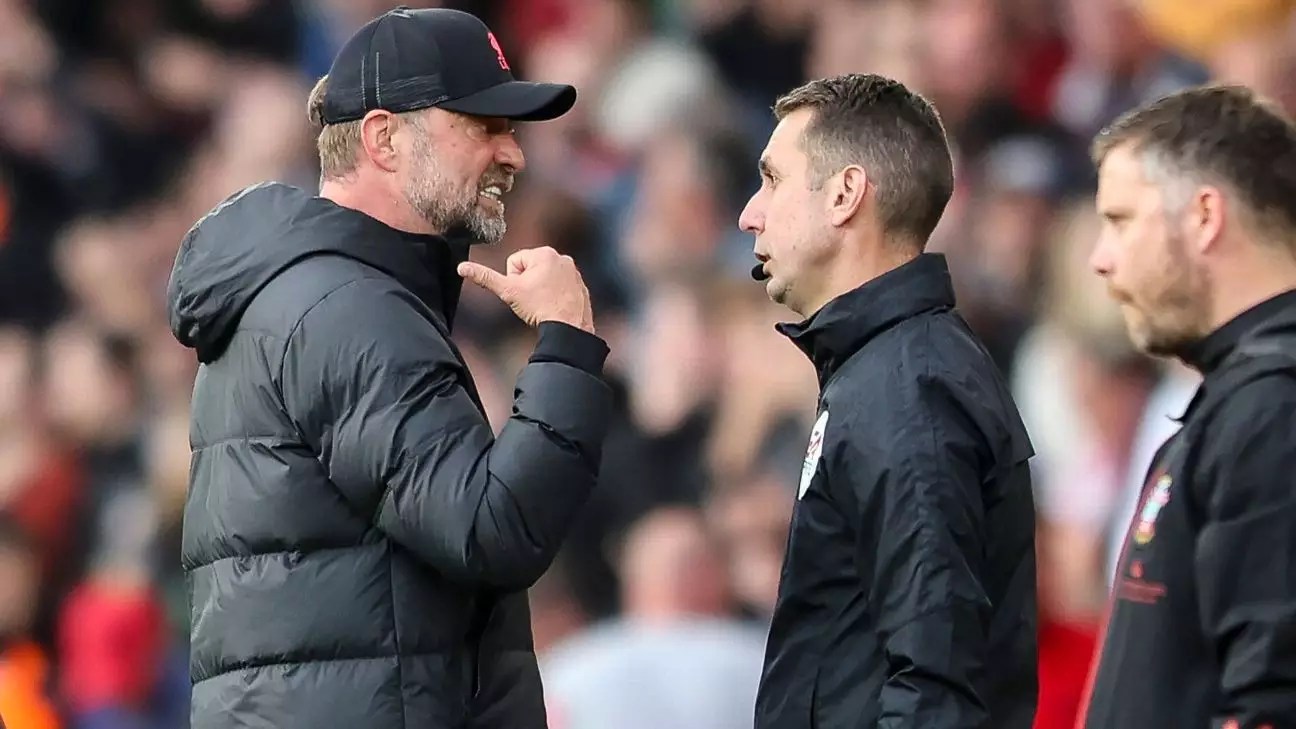Recent events surrounding Premier League referee David Coote have ignited a fervent debate regarding professionalism and the responsibilities of officials in sports. A video emerged on social media that allegedly captures Coote making derogatory remarks about Liverpool Football Club and its former manager, Jürgen Klopp. This revelation has thrown into question his ability to continue officiating at the highest levels of English football, triggering an immediate suspension as investigations are underway.
Coote, who officiated Liverpool’s 2-0 victory over Aston Villa just days prior, has been a mainstay in the Premier League since 2018. His comments have not only marred his personal reputation but also cast a shadow over the integrity of football officiating, raising concerns about possible biases against clubs and managers.
In the video, which features Coote seated next to an individual who poses questions about Liverpool and Klopp, the language used is alarming for someone in his position. Coote reportedly expresses disdain for Liverpool’s performance, using profane language to describe the team and calling Klopp an “absolute c—.” Such openness to criticism suggests a troubling lack of professionalism. Referees, particularly at the Premier League level, are expected to maintain impartiality and composure, regardless of personal opinions about the teams or their personnel.
The context of the comments, including references to past interactions with Klopp during a match against Burnley amidst pandemic-related restrictions, further complicates matters. It appears that Coote’s discontent stems from personal grievances, which can jeopardize his role as a neutral arbiter in future matches. Not only does this scenario risk the legitimacy of his officiating, but it also reflects poorly on the standards of behavior expected from officials in professional sports.
The immediate suspension imposed on Coote by the Professional Game Match Officials Limited (PGMOL) is a necessary step in response to what could be viewed as unprofessional conduct. This situation creates a ripple effect, casting doubt on Coote’s future as a top-flight referee. If the investigation confirms the authenticity of the video, it may lead to longer-term repercussions for his career, as fans and players alike grapple with the implications of referees harboring such biases against teams or their managers.
Moreover, this incident underscores a broader issue within the framework of football officiating—transparency and accountability. As champions of fair play, referees must not only uphold the rules of the game but also maintain a standard of integrity beyond reproach. The fallout from the Coote incident could potentially spark renewed calls for stricter oversight and training for referees. Enhancements in accountability measures may come into play to avoid such occurrences in the future.
The ongoing discourse stems not only from Coote’s particular comments but also from a growing awareness about the role of referees in influencing match outcomes through their decisions and behavior. With the heat of competition and the emotional stakes involved, it is imperative that referees remain above the fray. Public perception of referees has been under scrutiny for some time, with fans often questioning their impartiality and effectiveness during contentious matches.
As the investigation concerning Coote unfolds, it may become a pivotal moment for the PGMOL and the entire officiating body in football. The challenge lies in rebuilding public trust and ensuring that all officials commit to the ethical responsibilities that come with their roles.
While the fate of David Coote hangs in the balance, this incident serves as a critical reminder of the responsibilities held by sports officials. The fallout extends beyond an individual case—it is a defining moment for the integrity of the officiating profession in football. As scrutiny increases, the PGMOL must address these allegations thoroughly and transparently, ensuring that the officiating community emerges stronger and more accountable. Ultimately, the true test will lie in whether the lessons learned from this incident lead to systemic changes that prioritize professionalism and ethical conduct in the realm of sports officiating.


Leave a Reply